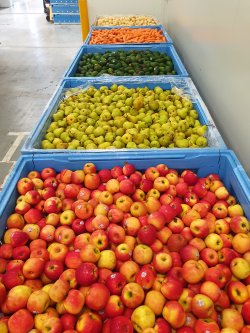Nourishing the Mind
This Mental Health Month we want to remind everyone of how closely food insecurity and mental health are intertwined. We play a critical role in supporting mental health by addressing both the physical and emotional challenges that come with food insecurity and supporting people with access to nutritious choices.
The very first thing we do is reduce stress and anxiety by providing immediate access to food. When people have their basic need for food met, they can focus on other areas of their life, such as finding employment, securing stable housing, or seeking mental health support, rather than being consumed by the stress of survival.
We also ensure we operate within community settings where individuals are treated with dignity and respect. This sense of being supported and valued can improve self-esteem and reduce feelings of isolation and shame, which often accompany food insecurity. We prioritise dignity and offer a welcoming and stigma-free environment—where our customers feel less ashamed about needing assistance.
Another way we can support people to improve their mental health is through the provision of healthy choices for people needing food relief. Research shows a diet higher in a wide range of fruits, vegetables, legumes, wholegrains and fish help reduce the risk of and improve depressive symptoms.
Recognising that a healthy, balanced diet is becoming increasingly unaffordable for Western Australian’s, we have transitioned to providing free fruit and vegetables to our registered customers over the past twelve months, we have provided 1,273,375 kgs of fruit to our charity partners, schools and directly to households. This equates to 37% of our overall food distribution total.
We also collaborate with other organisations, offering assistance beyond food. Due to the big increase in the demand for our services, we now have a Financial Support Worker from the Financial Wellbeing Collective at the Perth Airport site to assist customers with their needs onsite, five days a week.
Whether in person, or over the phone, when individuals reach out for food assistance, the Financial Support Worker who assesses the individuals needs can also refer them to supportive services they require such as housing support, job training, financial counselling, and healthcare services.
By relieving the burden of food costs, we can help individuals redirect their limited financial resources toward other critical areas, such as healthcare, therapy, or even stress-reducing activities.
Mental Health Week reminds everyone that mental health is just as important as physical health and encourages proactive care for a healthier, happier life.
We are working hard to make food one less thing people need to worry about.
 Contact us
Contact us Log in
Log in

